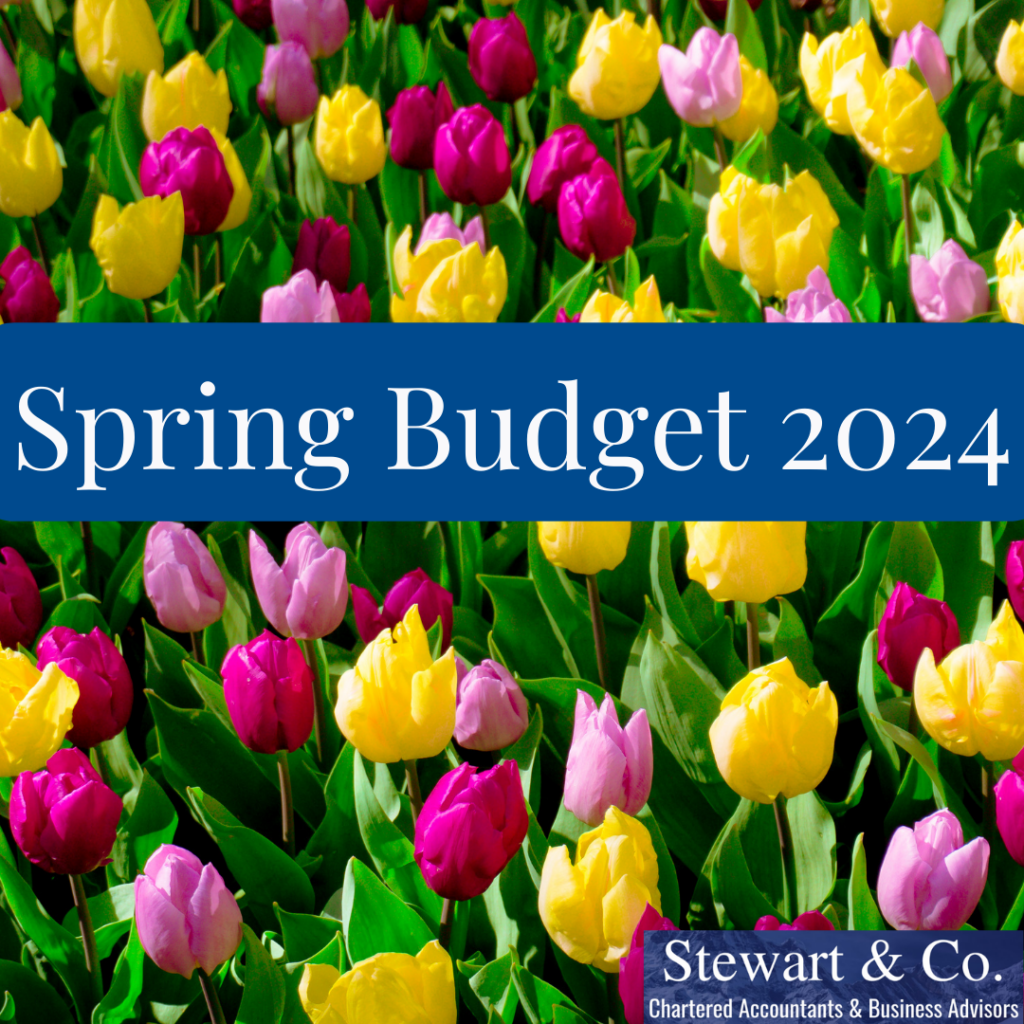Spring Budget 2024
Today, Chancellor Jeremy Hunt unveiled his pre-election Spring Budget 2024 to Parliament. With a weak economy and unwieldy budget deficit, many were wondering if he could really afford to provide tax cuts. However, the Chancellor seemed keen to get the message across that ‘lower taxes equal higher growth’ as he started off by promising more investment, more jobs, and lower taxes for long-term growth. The Chancellor stated that ‘to encourage hard work, we should let people keep as much as possible’ and that he wished to ‘raise wages and living standards for families’.
So, what did today’s Spring Budget bring for both individuals and businesses? Below we have summarised the key announcements:
Individuals
National Insurance Self-employed: The main rate of Class 4 will be cut again by a further 2%, from 8% to 6% from 6 April 2024. Combined with the abolishment of Class 2, this will save the average self-employed person on £28,000 over £650 compared to last year.
National Insurance Employee: Main rate will be cut again by a further 2%, from 10% to 8% from April 2024. This means the average worker on £35,400 will receive a tax cut of over £900 compared to last year.
With these changes the average earner now has the lowest effective tax rate since 1975.
ISA: New British ISA allowing an additional £5,000 annual investment in UK equities tax-free.
High Income Child Benefit Charge (HICBC): The Government plans to administer the HICBC on a household basis rather than an individual by April 2026 to end the unfairness of the current system. In the meantime, from April 2024, the threshold at which the HICBC kicks in will be increased from £50k to £60k. In addition, the rate at which the HICBC is charged will also be halved, meaning that Child Benefit will not be fully withdrawn until individuals earn £80,000 or more.
Fuel Duty: Frozen again until March 2025 with the temporary 5p cut also extended. This will save car drivers around £50 this year.
Alcohol Duty: The freeze announced in the Autumn Statement will be extended until 1 February 2025, saving consumers 2p on a pint of beer, 1p on a pint of cider, 10p on a bottle of wine and 33p on a bottle of spirit. This measure will benefit 38,000 British pubs.
Savings: A new British Saving Bond from NS&I will be available in April offering savers a guaranteed rate for 3 years, delivering better returns for savers.
Non-Domiciled: The Non-Domicile regime will be replaced by a modern, simpler and fairer scheme from April 2025 where new arrivals will have access to a more generous scheme – from 100 per cent UK tax relief on foreign income and gains for the first four years that they are tax resident here, before paying tax in the same way as everyone else. There will be transitional arrangements in place for current non-domiciled individuals. This reform abolishes the remittance basis of taxation.
Liability to inheritance tax (IHT) also depends on domicile status and location of assets and the Government will consult on the best way to move IHT to a residence-based regime in due course.
Furnished Holiday Lettings (FHL): The FHL tax regime will be abolished from April 2025.
Vape Duty: A Vape Duty will be introduced from October 2026 to protect young people and children from the harm of vaping, alongside a one-off increase in tobacco duty to recognise the role vapes play in helping people to quit smoking.
Capital Gains Taxes: The higher Capital Gains rate for residential properties will be reduced from 28% to 24 from April 2024.
Businesses
Growth Guarantee Fund: Small and medium sized enterprises will be supported to invest and grow through a £200 million extension of the Growth Guarantee Fund, helping 11,000 small businesses to access the finance they need.
VAT: The VAT registration threshold will be increased from £85,000 to £90,000 on 1 April 2024 which will take around 28,000 small businesses out of paying VAT altogether. The Chancellor stated that this measure was to help reduce administrative burdens for small business and is the first increase in 7 years.
Multiple Dwellings Relief: This will be abolished from June after showing no evidence of promoting investment in the private rented sector.
What could today’s measure mean for me?
The Government anticipates that today’s tax cuts, combined with the tax cuts announced at the Autumn Statement 2023, mean:
- A hard-working family with two earners on the average salary of £35,400 each will be better off by £1,826.
- An average full-time nurse on £38,900 will be better off by £1,053.
- A typical self-employed plumber on £34,361 will be better off by £846.
- The typical teacher on £44,300 will be better off by over £1,270.
We shall have to wait to see whether the Chancellor has taken sufficient action to sway voters ahead of the general election expected to take place in the autumn.
As always, our team are here to answer any questions you may have. Please do contact us if you have any questions or call us on 01276 61203
 Jo Hardy – Personal Tax Director
Jo Hardy – Personal Tax Director

